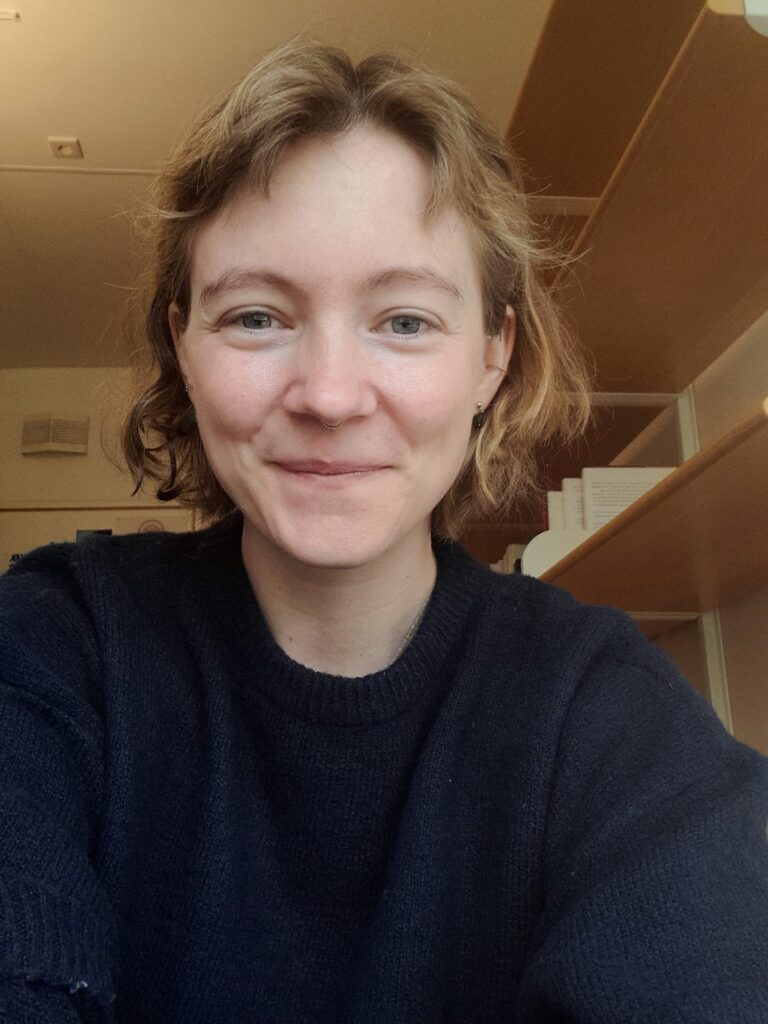
Posthumanism
Science and technology studies
Robotics
Sociology of materiality
Qualitative methods (ethnography)
Feminist theory
Consultation hours by appointment
09/2019
Master of Arts.
Title of thesis: Roboter bauen. Die Arbeit an der Mensch-Maschine-Differenz.
2017-2019
Studies of Sociology (Master of Arts), Johannes Gutenberg University Mainz
10/2016
Bachelor of Arts.
Title of thesis: Die Bedeutung sozialer Anerkennung in gesellschaftlichen Unterwerfungsprozessen.
2011-2016
Studies of Sociology and Cultural Anthropology (Bachelor of Arts), Johannes Gutenberg University Mainz
since 2022
Research associate in the DFG project “Mechanical human differentiation. Technical knowledge and the ethnosociology of robotics”Johannes Gutenberg-University Mainz
03/2024-06/2024
Visiting Researcher at the Posthumanities Hub, Linköping University (at the invitation of Cecilia Åsberg)
since 2019
Research associate, Institute of Sociology, Johannes Gutenberg University Mainz
2017-2019
Graduate assistant, Institute of Sociology, Johannes Gutenberg University Mainz
Link, Hannah (2023): Die Schulbuchentwicklung als sozio-materieller Aushandlungsprozess In: Richard Groß/ Rita Jordan (ed.): KI-Realitäten. Modelle, Praktiken, Topologien maschinellen Lernens. Bielefeld: transcript. pp. 143-16.
Link, Hannah/Kalthoff, Herbert (2023): Die Naturalisierung des Roboters. Zu einer Soziologie technischen Wissens. In: Torsten Cress/Oliwia Murawska /Annika Schlitte (ed.): Posthuman? Neue Perspektiven auf Natur/Kultur. Paderborn: Fink/Brill, pp. 261-280.
Kalthoff, Herbert/Link, Hannah (2021): Zukunftslaboratorien. Technisches Wissen und die Maschinenwesen der Robotik. In: Dilek Dizdar/Stefan Hirschauer/Johannes Paulmann/Gabriele Schabacher (eds.): Humandifferenzierung. Disziplinäre Perspektiven und empirische Sondierungen. Weilerwist: Velbrück, pp. 314-341.
Humanoide Maschinen bauen. Die Praxis der Robotik. Ringkolloquium „Wer ist [der] Mensch? Aktuelle Debatten in der Erziehungswissenschaft”, Universität Mainz, 13.06.2025.
A Feeling for the Machine. Exploring Affective Knowledge Practices in Robotics , 7th Nordic STS “in and out of the laboratory” KTH Stockholm, 11.06.2025.
Träumen Roboter vom Bluten? Feministische Potenziale posthumanen Menstruierens . Workshop “PERIOD. Transdisciplinary perspectives on menstruation”, University of Mainz, 11.10.2024
Robo-Intimacy? The Balancing Act of Fearing, Neglecting, and Caring for Robots . EASST-4S Conference “Making and Doing Transformations”, Vrije University, Amsterdam, 19.07.2024.
Techno-Organic Environments. Exploring the Intersections of Technology, Humans, and Nature in Military Aviation and Robotics . Webinar of the Posthumanities Hub, Linköping University, 30.05.2024 (with Lisa Anders).
Challenging Environments. The Outside of Technosciences . Inaugural Conference of STSing “Leakage”, TU Dresden, 22.03.2024 (with Lisa Anders).
Von der Inskription zur Ko-Skription. Technisierung von Wissen zwischen Einhegung und Kollaboration . Conference of the Section Sociology of Knowledge “Technisierung von Wissen”, TU Chemnitz, 18.03.2024.
Designing Humanoid Robots. Knowledge Practices of Robotics . Symposium “Living techno-Natures: Biohybrid Objects, Life, and Technology”, Goethe University, Frankfurt am Main, 07.03.2024.
Matter of Intelligence. The Technoscientific Production of Posthuman Sociality . STS Conference “Interesting Worlds to Come. Science & Technology Studies facing more-than-human challenges”, University of Bologna & Italian Society of Science and Technology Studies, Bologna, 28.06.2023.
Testing as Relating. Getting a Sense of a Humanoid Robot , STS-Hub.de 2023 “Circulations”, Human Technology Center, Aachen, 17.03.2023 (with Herbert Kalthoff).
Verschaltungsintensität. Von der Autarkie zur Relationalität von Intelligenz im Feld der Robotik. Interdisziplinäre Tagung des Schaufler Kolleg Dresden: Künstliche Intelligenz als geistes- & sozialwissenschaftlicher Begriff, TU Dresden, 1.12.2021.
Die Maschinenwesen der Robotik. Conference of the Human Differentiation Forum: Human differentiation. Disciplinary perspectives and empirical explorationsJohannes Gutenberg University Mainz, 26.06.2020 (with Herbert Kalthoff).
Humanoide Roboter. Zur Ambiguität von Maschinenwesen. 4th Mainz Symposium of Social and Cultural Studies at the SoCum research unit [im Rahmen der Forschungsinitiative 2008-11]: Jenseits des Menschen. Posthuman perspectives on nature/culture, Johannes Gutenberg University Mainz, 20.09.2019 (with Herbert Kalthoff).
Seminar: Qualitative Methods (winter semester 2022/2023)
Seminar: Research Workshop I Ethnography (winter semester 2021/2022)
Seminar: Research Workshop II Ethnography (summer semester 2021)
Seminar: Equality and Difference (summer semester 2020, winter semester 2020/21)
Seminar: Communication and Interaction (regular since winter semester 2019)
Seminar: Sociology of Human Robotics and Cybernetics Seminar: Communication and Interaction (SoSe 2024)
Seminar: Sociomateriality (SoSe 2022)
German Sociological Association (Section Sociology of Knowledge)
Gutenberg Graduate School of the Humanities and Social Sciences (GSHS)
Under the auspices of posthumanism, the extent to which non-humans can be integrated into sociological studies is currently being discussed. While the founding mothers and fathers of Sociology used the human subject as the starting point and focus of their analysis, it is now a matter of adjusting the sociological view: Matter, objects, animals and ecological processes are just as suspected of being the starting point of an action as the human being. In this way, humans and non-humans are symmetrized and described either as interconnected or as opposing actors. Informed by feminist posthumanisms and practice theories, the dissertation project asks how the ‘human’ is constituted as such. In the case of robotics, the dissertation project undertakes a sociological-ethnographic analysis of the differentiation between human and non-human. The leading assumption is that neither ‘the human’ nor ‘the non-human’ is subject to natural, irrefutable facts, but is to be understood as a product of socio-material ordering. The focus is on human-theoretical assumptions about ‘the human’ and the informational and mechanical implementation of these assumptions in the form of robots. The guiding question is how exactly the distinctions between humans and machines are made in the construction of robots and in what way robots are induced with this knowledge of distinction. The dissertation project follows on from programs of study in the sociology of knowledge and posthumanism and contributes to a theory of the human